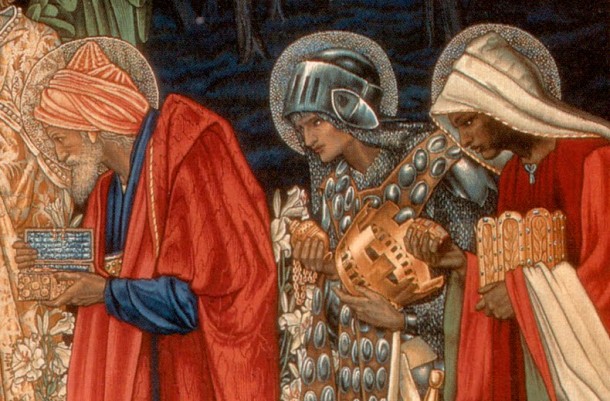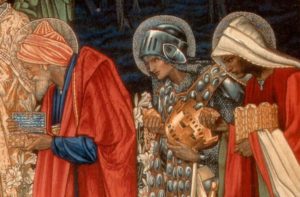Central idea: The Epiphany of the Redeemer. Doctrine: The Church is the sacrament of human unity. Practical application: Prayer for Christian unity.
To view Lectionary 20 click here.
Reading 1 Is 60:1-6
Rise up in splendor, Jerusalem! Your light has come,
the glory of the Lord shines upon you.
See, darkness covers the earth,
and thick clouds cover the peoples;
but upon you the LORD shines,
and over you appears his glory.
Nations shall walk by your light,
and kings by your shining radiance.
Raise your eyes and look about;
they all gather and come to you:
your sons come from afar,
and your daughters in the arms of their nurses.Then you shall be radiant at what you see,
your heart shall throb and overflow,
for the riches of the sea shall be emptied out before you,
the wealth of nations shall be brought to you.
Caravans of camels shall fill you,
dromedaries from Midian and Ephah;
all from Sheba shall come
bearing gold and frankincense,
and proclaiming the praises of the LORD.
- Christ is the light that Isaiah prophesizes will illuminate Jerusalem and draw to her both the scattered Chosen People and the pagan nations.
- Mary was the first persons to experience the joy of this manifestation of the salvation of the world coming from the Jews. After that came Elizabeth her cousin, St. Joseph, and Zechariah. After that came the lowly shepherds. And today, this epiphany comes to the Gentile magi.
Responsorial Psalm Ps 72:1-2, 7-8, 10-11, 12-13
R. Lord, every nation on earth will adore you.
O God, with your judgment endow the king,
and with your justice, the king’s son;
He shall govern your people with justice
and your afflicted ones with judgment.Justice shall flower in his days,
and profound peace, till the moon be no more.
May he rule from sea to sea,
and from the River to the ends of the earth.The kings of Tarshish and the Isles shall offer gifts;
the kings of Arabia and Seba shall bring tribute.
All kings shall pay him homage,
all nations shall serve him.For he shall rescue the poor when he cries out,
and the afflicted when he has no one to help him.
He shall have pity for the lowly and the poor;
the lives of the poor he shall save.
- The promised happiness of the inhabitants of the world will come from the Messiah-King who reigns in the New Jerusalem. Expressed in theological terms, the graces of the Redemption will flow from Christ (their source) to the world (their object) through his Church (his instrument).
- The reason that he will have all authority is not his capacity for inflicting violence—as is the case with any present earthly authority—but because of his goodness. His goodness is seen in his rescuing of the poor and afflicted. This is the category that every inhabitant of the earth is actually in if he or she has the humility and wisdom to look clearly.
Reading 2 Eph 3:2-3a, 5-6
Brothers and sisters:
You have heard of the stewardship of God’s grace
that was given to me for your benefit,
namely, that the mystery was made known to me by revelation.
It was not made known to people in other generations
as it has now been revealed
to his holy apostles and prophets by the Spirit:
that the Gentiles are coheirs, members of the same body,
and copartners in the promise in Christ Jesus through the gospel.
- One of the four marks of the Church is that she is catholic. Christ sends her out into the world to bring in to him the whole human race. The reason for this is so that the unity that existed in the beginning between God and humanity, but which has been shattered by sin, can be reestablished. As the Catechism puts it so beautifully,
All men are called to belong to the new People of God. This People, therefore, while remaining one and only one, is to be spread throughout the whole world and to all ages in order that the design of God’s will may be fulfilled: he made human nature one in the beginning and has decreed that all his children who were scattered should be finally gathered together as one. . . . The character of universality which adorns the People of God is a gift from the Lord himself whereby the Catholic Church ceaselessly and efficaciously seeks for the return of all humanity and all its goods, under Christ the Head in the unity of his Spirit. (LG 13, CCC 831)
Gospel Mt 2:1-12
When Jesus was born in Bethlehem of Judea,
in the days of King Herod,
behold, magi from the east arrived in Jerusalem, saying,
“Where is the newborn king of the Jews?
We saw his star at its rising
and have come to do him homage.”
When King Herod heard this,
he was greatly troubled,
and all Jerusalem with him.
Assembling all the chief priests and the scribes of the people,
He inquired of them where the Christ was to be born.
They said to him, “In Bethlehem of Judea,
for thus it has been written through the prophet:
And you, Bethlehem, land of Judah,
are by no means least among the rulers of Judah;
since from you shall come a ruler,
who is to shepherd my people Israel.”
Then Herod called the magi secretly
and ascertained from them the time of the star’s appearance.
He sent them to Bethlehem and said,
“Go and search diligently for the child.
When you have found him, bring me word,
that I too may go and do him homage.”
After their audience with the king they set out.
And behold, the star that they had seen at its rising preceded them,
until it came and stopped over the place where the child was.
They were overjoyed at seeing the star,
and on entering the house
they saw the child with Mary his mother.
They prostrated themselves and did him homage.
Then they opened their treasures
and offered him gifts of gold, frankincense, and myrrh.
And having been warned in a dream not to return to Herod,
they departed for their country by another way.
- The word epiphany means appearance or manifestation. Literally it means showing to.
- We tend to think of the feast of the Epiphany as the sudden appearance of the gift-giving pagan Magi to Christ, but the revelation is really the other way around. It is the manifestation that Christ is not just the savior of God’s Chosen People, the Jews, but that he is the redeemer of the whole world; that is, he is the salvation of the Gentiles, too.
Doctrine: The Church is the sacrament of human unity
- The Church is the means by which God gathers all his human children together. The Church’s “root” is the people descended from Abraham onto which are grafted the Gentiles who believe. (CCC 60)
- “The Church is a cultivated field, the tillage of God. On that land the ancient olive tree grows whose holy roots were the prophets and in which the reconciliation of Jews and Gentiles has been brought about and will be brought about again. That land, like a choice vineyard, has been planted by the heavenly cultivator. Yet the true vine is Christ who gives life and fruitfulness to the branches, that is, to us, who through the Church remain in Christ, without whom we can do nothing.” (LG 6, CCC 755)
- “At all times and in every race, anyone who fears God and does what is right has been acceptable to him. He has, however, willed to make men holy and save them, not as individuals without any bond or link between them, but rather to make them into a people who might acknowledge him and serve him in holiness. He therefore chose the Israelite race to be his own people and established a covenant with it. He gradually instructed this people. . . . All these things, however, happened as a preparation for and figure of that new and perfect covenant which was to be ratified in Christ . . . the New Covenant in his blood; he called together a race made up of Jews and Gentiles which would be one, not according to the flesh, but in the Spirit.” (LG 9, CCC 781)
- The foundation of the Church is none other than the Son of the living God (CCC 442).
- The Church will not be all God means it to be until the Jews are fully incorporated into it so that “God may be all in all” (CCC 674).
- The Church is “the ‘convocation’ of all men for salvation.” Thus, “the Church in her very nature is missionary, sent by Christ to all the nations to make disciples of them” (CCC 767).
- The Church is called a sacrament by analogy because she “both contains and communicates the invisible grace she signifies” (CCC 774).
- “The seven sacraments are the signs and instruments by which the Holy Spirit spreads the grace of Christ the head throughout the Church which is his Body” (CCC 774).
- “Christ himself is the mystery of salvation: ‘For there is no other mystery of God, except Christ.’ The saving work of his holy and sanctifying humanity is the sacrament of salvation, which is revealed and active in the Church’s sacraments.” (CCC 774)
- The Church, then, “is like a sacrament—a sign and instrument, that is, of communion with God and of unity among all men” (CCC 775).
- “The Church’s first purpose is to be the sacrament of the inner union of men with God. Because men’s communion with one another is rooted in that union with God, the Church is also the sacrament of the unity of the human race. In her, this unity is already begun, since she gathers men ‘from every nation, from all tribes and peoples and tongues’; at the same time, the Church is the ‘sign and instrument’ of the full realization of the unity yet to come.” (CCC 775)
- “As sacrament, the Church is Christ’s instrument. ‘She is taken up by him also as the instrument for the salvation of all,’ ‘the universal sacrament of salvation,’ by which Christ is ‘at once manifesting and actualizing the mystery of God’s love for men.’ The Church ‘is the visible plan of God’s love for humanity,’ because God desires ‘that the whole human race may become one People of God, form one Body of Christ, and be built up into one temple of the Holy Spirit.’” (CCC 776)
Practical application: Prayer for Christian unity
- The Week of Prayer for Christian Unity is January 18-25, the original days of the feasts of the Chair of St. Peter (January 18 (February 22 now)) and the Conversion of St. Paul (January 25).
- For over a hundred years, Catholics, Orthodox, and Protestants have joined in praying for Christian unity.
- This year’s theme is “Your Right Hand, O Lord, Glorious in Power (Exodus 15:6).” “Contemporary challenges again threaten to enslave and destroy the dignity of the human person created in the image and likeness of God. The unity [of] Christ in His body, the Church, is often obscured by both personal sin and social structures of sin. The right hand of God that brought the people out of slavery, gave continued hope and courage to the Israelites, as it continues to bring hope to those seeking Christian Unity.”
The Homiletic Directory suggests the following additional Catechism points and themes for the Solemnity of the Epiphany:
- CCC 528, 724: the Epiphany
- CCC 280, 529, 748, 1165, 2466, 2715: Christ the light of the nations
- CCC 60, 442, 674, 755, 767, 774-776, 781, 831: the Church, sacrament of human unity


Leave a Reply